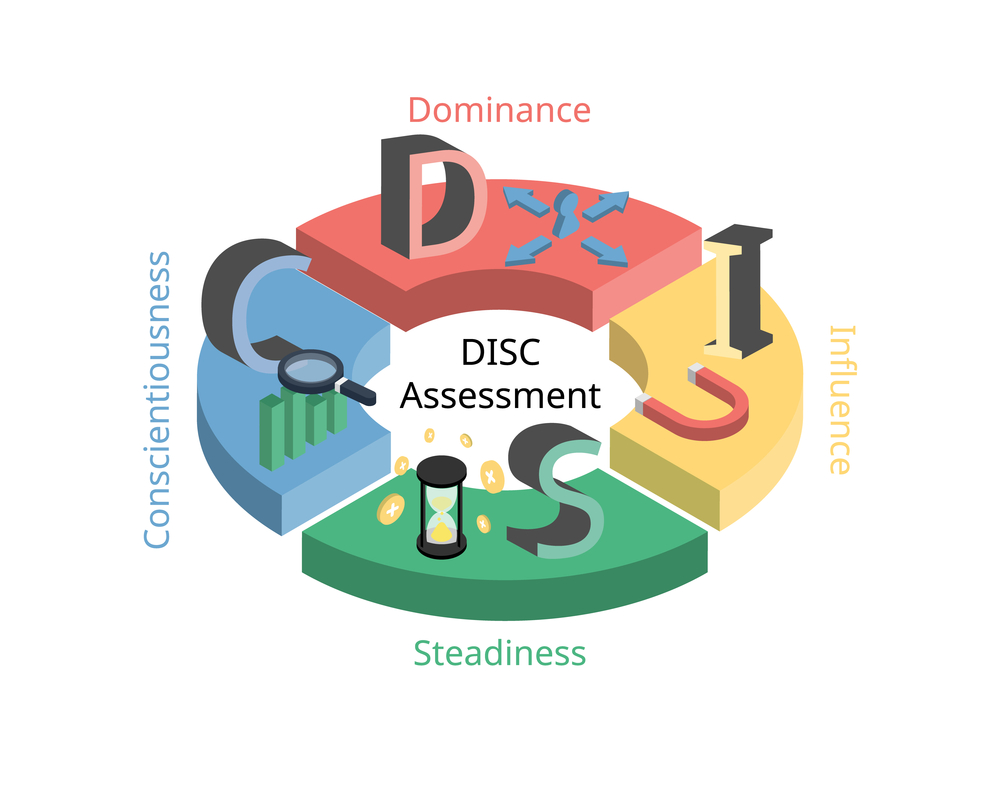DISC Workshop Guide: Understanding Yourself and Others for Success
When I was studying high impact leadership development programs interviewing participants, one element of the programs that I kept hearing about again and again was the use of self-assessments or profiles to help the participants gain awareness about themselves. One of the most common assessments or profiles that programs were using was the DISC profile. Often, leadership or professional development programs might start with a DISC workshop.
Reach out to us at [email protected] if you are interested in a DISC workshop (or some other leadership workshop utilizing self-assessments) for your organization or team. Read on to learn more about DISC and what a DISC workshop might entail.
What is the DISC Profile?
The DISC Profile is a personality assessment tool that helps you understand your own communication style and the styles of others. DISC stands for Dominant, Influential, Steady, Conscientious, each representing a fundamental personality type with distinct strengths and preferences. By understanding your DISC style and those of your colleagues, you can improve communication, collaboration, and overall effectiveness within your organization.
Benefits of a DISC Workshop:
- Enhanced Self-awareness: Gain valuable insights into your own communication style, strengths, and weaknesses.
- Improved Communication: Learn to adapt your communication to different personality styles, leading to clearer and more effective interactions.
- Stronger Teams: Discover how to leverage the strengths of diverse personalities to build high-performing teams.
- Effective Leadership: Develop tailored leadership approaches for motivating and engaging team members with different DISC styles.
- Improved Client Interactions: Learn to adapt your communication style to build stronger client/customer relationships.

What to Expect in a DISC Workshop:
DISC workshops come in various formats to suit your needs. Here’s a breakdown of some common options:
- Workshop Length:
- Short Session (1-2 hours): Ideal for introductions to DISC. Focuses on understanding the four styles, individual DISC assessments, and basic communication strategies.
- Half-Day or Full-Day Workshop: Provides a deeper dive into DISC. Includes in-depth exploration of each style, communication exercises, team-building activities, and strategies for applying DISC in different scenarios.
- Multi-Day Workshop (2-3 days): The most comprehensive option, offering in-depth exploration of DISC, advanced communication techniques, conflict resolution strategies specific to DISC styles, and personalized coaching sessions.
- Workshop Format:
- In-Person Workshop: Offers a highly interactive experience with facilitated discussions, group activities, and role-playing scenarios.
- Virtual Workshop: Provides a convenient option for remote teams. Utilizes online platforms for presentations, discussions, and breakout sessions.
- Blended Learning: Combines in-person and virtual elements, offering flexibility and a richer learning experience.
- Workshop Integration:
- Stand-alone Workshop: Provides a focused learning experience on DISC principles.
- Part of Leadership Development Program: Integrates DISC with leadership skills training, equipping participants to leverage DISC for effective team management.
- Ongoing Program: Offers a comprehensive approach with multiple workshops, coaching sessions, and online resources, allowing for continuous learning and application of DISC principles.
No matter the format, a typical DISC workshop might include:
- Pre-workshop Assessment: Participants complete a DISC assessment to understand their individual style.
- Debrief Session (Optional): A one-on-one session with a facilitator to discuss your DISC results in detail.
- Introduction to DISC: Learn the core concepts, explore the four styles (D, I, S, C), and discover your own DISC profile.
- Communication Styles: Uncover how each DISC style communicates, both verbally and nonverbally. Practice identifying DISC styles in others through real-world examples.
- DISC in Action: Engage in activities and discussions to practice applying DISC principles in real-world scenarios like:
- Teamwork: Explore how to leverage DISC styles to build strong, collaborative teams.
- Leadership: Develop tailored leadership approaches for motivating and engaging team members with different DISC styles.
- Conflict Resolution: Learn strategies for navigating conflict productively considering different DISC styles.
- Client Interactions: Practice adapting your communication style to build stronger client/customer relationships based on their DISC profiles.
- Action Planning: Develop strategies for using DISC to improve communication, teamwork, and overall effectiveness within your organization.
- Goal Setting: Set specific, measurable, achievable, relevant, and time-bound (SMART) goals for applying DISC principles in your daily interactions.
- Post-workshop Support (Optional): Depending on the workshop format, ongoing support may be available through access to online resources, coaching sessions, or alumni communities.
DISC Workshops as a part of a Larger Leadership Development Program
According to the Grounded Theory of High Quality Leadership Programs, a high-impact action is programs engage students in a variety of activities designed to help them gain a greater understanding of themselves, including personality, strengths, style, skills, and values assessments. The outcomes from these program actions help students identify their own personalty, leadership styles, strengths, and opportunities for improvement through self-analysis. A DISC workshop as a part of the program is an example of this.
Additional Resources and Next Steps:
- This guide provides a basic framework. Specific activities, discussions, and case studies will vary based on the workshop format and your organization’s needs.
- Upon completion, you’ll receive resources for further exploration, including books, articles, and websites related to DISC.
- Remember, DISC is a tool for continuous learning. Practice applying these principles in your daily interactions, and consider ongoing programs to further develop your DISC mastery.
- You might try integrating results of other assessments or profiles together with AI through the self-assessment GPT to get a more complete picture of yourself.
By incorporating a DISC workshop into your professional development plan, you gain valuable insights into yourself and others. Please reach out to us at [email protected] if you are interested in a DISC workshop for your organization or team.
